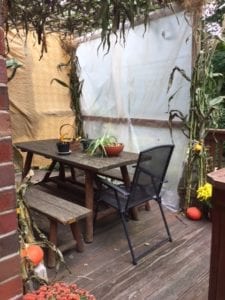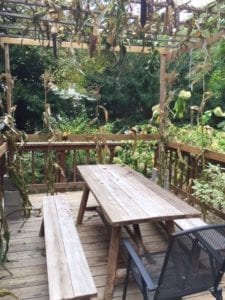
Sukkah 2018

Sukkah 2020
As you walk, bike,or drive through the Garden City in the early fall, you may observe a temporary hut alongside some of the houses. Called a sukkah, this structure plays a central role in the Jewish festival of Sukkot. The Bible states that the Israelites employed such huts at times in their journey from Egypt to the Promised Land. Historically, sukkahs provided later generations a shelter next to fields far from home so that they could finish the harvest before the rainy season commenced. Hence, American Jews traditionally decorate their sukkahs with gourds, Indian corn, grapes, and the like.
Some Jews eat their meals and even sleep in their sukkahs during the week-long festival. Even the Orthodox, fortunately, are excused from staying in them if the weather is inclement. Remember that the custom originated in the Middle East, where early October is dry and the temperature mild. Jews imagine that the spirits of their heroic ancestors, including Abraham and Moses, visit their sukkahs, a different one each day. It is also customary to invite family, friends, and neighbors to spend time with you in your sukkah.
Herein lies the dilemma. Though the Patriarchs and Matriarchs may be immune to Covid-19, most of us are not. Socializing in sukkahs might be marginally safer than in our dining rooms, but some of the the traditional requirements- at least three walls, often made of canvas, and a partially completed roof- might create a structure that traps Covid aerosols. Some sukkahs are relatively small, barely allowing sufficient social distance. And when we dine, off come our masks. Need I point out the most recent demonstration of the danger of social contact without masks?
In response, many of us have altered the construction of our sukkahs. Check out the adjustment that my wife and I made to our sukkah this year; we removed the cloth and plastic covers on the three walls, and we thinned the supply of branches and husks, called “s’chach,” on the roof. Such a wide-open sukkah should allow for freer, safer air flow. It will also mean, unfortunately, that the sukkah will be colder when temperatures drop into the forties and fifties at dinner time. Ironically, this additional discomfort is in keeping with the traditional view of the sukkah: it is temporary and fragile, like human existence itself. In the era of the Pandemic, don’t we know it!

Thanks for sharing! We did not build one at all this year. Glad to see how you adapted to the current situation. Chag Sameach
Good to remember how many Americans and folks around the world sleep with little or no protection out of doors every night. And how many folks Covid may be sending out of doors when they can’t pay their rent due to loss of work. I think this concern may be embedded in the ritual as well.
Lovely! Chag sameach.